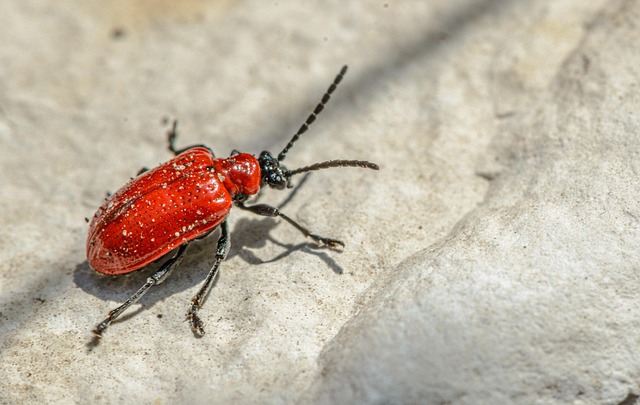Modern pest control services face challenges from pest resistance and consumer demand for eco-friendly alternatives, leading to the adoption of innovative solutions like real-time monitoring, targeted treatment methods, data analytics, smart IoT devices, and Integrated Pest Management (IPM). These advancements aim to enhance effectiveness while minimizing chemical pesticide use, promoting a sustainable and healthier living environment. Homeowners increasingly seek chemical-free options, driving further development of eco-friendly technologies such as heat treatment, ultrasonic repellents, and ionization devices. This shift prioritizes non-toxic solutions like natural repellents and beneficial insects, contributing to a balanced ecosystem while meeting the growing demand for effective pest control services.
In today’s modern homes, innovative pest control technologies are transforming the way we manage unwelcome intruders. Understanding the evolving challenges of pest control is crucial for effective management. This article explores smart and connected solutions leveraging advanced technology, offering chemical-free alternatives for safer environments, and integrating sustainable practices into everyday pest control services. Discover how these cutting-edge methods are revolutionizing home protection against pests.
Understanding Modern Pest Control Challenges
In modern homes, understanding pest control challenges has evolved significantly with advancements in technology and changing environmental norms. Unlike traditional methods that relied heavily on chemical pesticides, contemporary pest control services now face the task of eradicating pests while minimizing potential harm to human health and the environment. The rise of resistance among pests to commonly used chemicals, coupled with increasing consumer awareness about eco-friendly products, has pushed the industry towards innovative solutions.
These challenges demand a more sophisticated approach that incorporates smart technologies, such as digital monitoring systems that detect pest activity in real-time, and targeted treatment methods that utilize less toxic chemicals or biological agents. Modern pest control services also leverage data analytics to predict and prevent infestations, ensuring a proactive rather than reactive strategy. This shift not only enhances the effectiveness of pest control but also contributes to a more sustainable and healthier living environment for homeowners.
Smart and Connected Solutions for Home Pest Management
Modern homes are embracing smart and connected solutions for pest control, transforming traditional methods into efficient, tech-driven approaches. Internet of Things (IoT) devices, such as sensors and smart traps, monitor activity levels within a home’s ecosystem, detecting even the slightest signs of infestation. These innovations allow for immediate action, with alerts sent directly to homeowners’ devices.
Connected pest control systems integrate seamlessly with existing home automation networks, enabling users to manage pests remotely via mobile apps. This not only offers convenience but also contributes to more effective pest management. By analyzing data from sensors and traps, these smart solutions can identify specific areas of concern, target problem zones precisely, and reduce the reliance on chemical pesticides.
Chemical-Free Approaches to Effective Pest Control
In today’s world, many homeowners are seeking chemical-free approaches to pest control, driven by concerns about environmental impact and health safety. Traditional pest control services often rely heavily on synthetic chemicals, which can leave lingering residues and potentially harm non-target organisms, including pets and beneficial insects. However, innovative technologies are emerging to change this narrative.
Eco-friendly methods like integrated pest management (IPM) focus on prevention, biological controls, and targeted treatments. IPM employs natural predators, parasites, and diseases to manage pests, minimizing the need for chemical interventions. Additionally, new tools such as heat treatment, ultrasonic repellents, and ionization devices offer effective alternatives. These modern solutions not only reduce environmental pollution but also ensure safer living spaces for families and pets, aligning with the growing demand for sustainable pest control services.
Integrating Sustainable Practices in Everyday Pest Control Services
In the realm of modern pest control, there’s a growing emphasis on integrating sustainable practices that not only minimize environmental impact but also enhance safety for residents. This shift reflects a broader trend in the industry towards eco-friendly and non-toxic solutions. By adopting greener methods, pest control services can effectively manage pests without relying heavily on synthetic chemicals. These innovative approaches include the use of natural repellents, beneficial insects, and advanced technology like smart sensors and heat treatments, all of which reduce the ecological footprint while maintaining high standards of pest management.
Incorporating sustainable practices into everyday pest control services offers multiple benefits. It promotes a healthier living environment for homeowners, especially families with children and pets. Moreover, it contributes to a more balanced ecosystem by preserving beneficial insects and reducing water contamination from chemical runoff. As consumers become increasingly conscious of the products they use in their homes, professional pest control companies are meeting this demand with innovative, eco-conscious solutions that deliver effective results.
Modern homes face evolving pest control challenges, but innovative technologies offer effective and sustainable solutions. Smart, connected devices provide real-time monitoring, while chemical-free methods ensure a safer environment for residents and pets. Integrating sustainable practices not only reduces environmental impact but also enhances the overall efficiency of pest control services. By adopting these advanced techniques, homeowners can enjoy a comfortable living space free from pests, contributing to a healthier and more eco-friendly lifestyle.
